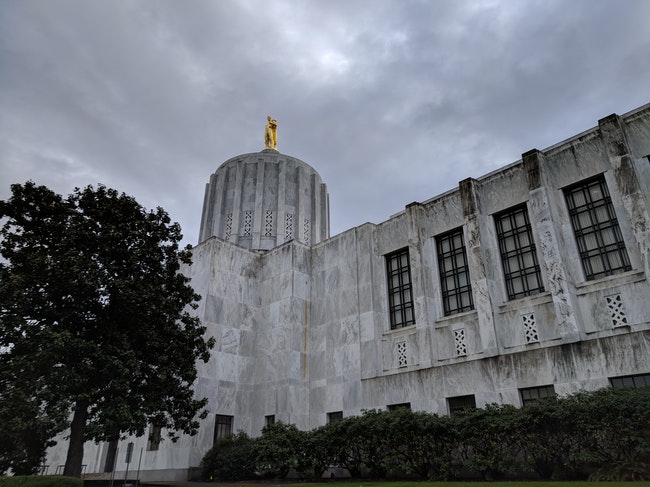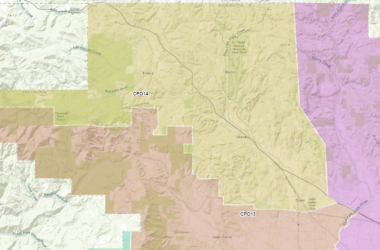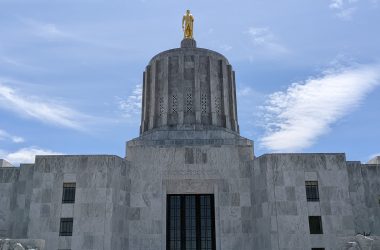 The Oregon Capitol building in Salem. Photo: Chas Hundley
The Oregon Capitol building in Salem. Photo: Chas Hundley
A bill sponsored by Rep. Karin Power (D-Milwaukie) would prohibit the sale of petroleum diesel fuel for use in any motor vehicle by January 2027, and although no meetings or hearings are scheduled yet by the Joint Committee on Transportation, observers already are making a lot of noise about the bill.
House Bill 3305 would begin phasing out the sale of petroleum diesel fuel on Jan. 2, 2024, in the Portland metro area — Clackamas, Multnomah, and Washington counties — at all non-retail gas stations where fuel is dispensed through a pump that is activated by a key or a card. (Think Pacific Pride gas stations, which are found throughout Oregon and used primarily by county and state workers and commercial operations to fill the tanks of fleet and contractor vehicles.)
The sale of diesel fuel by retail dealers, meaning a typical gas station, would cease on Jan. 1, 2025, in Clackamas, Multnomah, and Washington counties. And on Jan. 1, 2027, diesel fuel could no longer be sold at any gas station anywhere in the state of Oregon.
On March 10, OPB reported backers of the bill believe ending the sale of diesel fuel will lead to “the widespread use of renewable diesel.” Renewable diesel fuels, sometimes called “green diesel,” are those that consist of a blend of petroleum diesel and biodiesel, or other renewable diesel fuels.
Renewable diesel can be used in all existing diesel engines, petroleum pipelines, and storage tanks, the federal Energy Information Administration says. Though renewable diesel is the same in chemical makeup as regular diesel fuel, it’s made from nonpetroleum sources like cooking oils, vegetable oils, and other natural fats, and burns clean, unlike fossil fuels.
The trucking and timber industries are not in favor of HB 3305, saying the cost of renewable diesel would put too much of a strain on industry revenues.
Oregon’s Clean Fuels Program, along with federal funding, provides subsidies for producers of renewable diesel, which is much more expensive to make than regular diesel fuel. California has a similar subsidy program that is reportedly well-funded. Chemical and Engineering News reported that Phillips66, Global Clean Energy, and Marathon Oil all plan to convert their petroleum refineries in California to produce renewable diesel made from fats, greases, cooking oil, and soybean oil.
Jana Jarvis, executive director of the Oregon Trucking Association, told TruckersNews.com that there simply isn’t enough of an existing supply of renewable diesel in Oregon and that a production facility would need to be constructed in the state in order for renewable diesel to be affordable to large fleets.
Another bill was amended through the “gut and stuff” process by state Rep. Rob Nosse, D-Portland, to set a series of taxes on equipment used in logging, construction, and farming, and would tax the off-road diesel used by these heavy-duty vehicles and equipment.
Report: Oregon not close to meeting its greenhouse gas reduction goals
Oregon Democrats during the last two legislative sessions have been trying to pass legislation that deals with cutting, ending, or offsetting carbon and greenhouse gas emissions, and creating electric vehicle charging stations, but their efforts have been met with significant pushback from Republicans and the trucking and logging industries.
In June 2019, Republicans walked out of the Oregon Capitol, with some even leaving the state, in protest of House Bill 2020, the so-called cap-and-trade bill introduced by environmental lobbyist coalition Renew Oregon that aimed to reduce fossil fuel emissions by placing limits on the amount of carbon allowed to be emitted by vehicles, industry, and all other sources.
Later, on March 10, 2020, Gov. Kate Brown signed an executive order directing state agencies to take action to reduce greenhouse gas emissions “at least 45 percent below 1990 emission levels” by 2035, and at least 80 percent below 1990 levels by 2050.
However, the Oregon Global Warming Commission released its Biennial Report to the Oregon Legislature 2020 that says the impact of climate change “could not be more evident” after witnessing the tragedies the state experienced in 2020, and that Oregon is nowhere close to meeting its goal of reducing greenhouse gas emissions by 2035 and 2050, let alone right now.
The report goes on to say that Oregon didn’t come close to meeting its 2007 goal of reducing greenhouse gas emissions to below 1990 levels by 2020. In fact, data collected for the study found Oregon exceeded its reduction goal by 26 percent, or 13 million metric tons of carbon dioxide equivalent (CO2e), which erased all of the gains made since 2010. The report says Oregon currently is on a path to miss the 2035 and 2050 goals from Gov. Brown’s executive order by 23 and 54 million metric tons CO2e, respectively.
More information about renewable diesel fuel production is available here on the EIA website.






